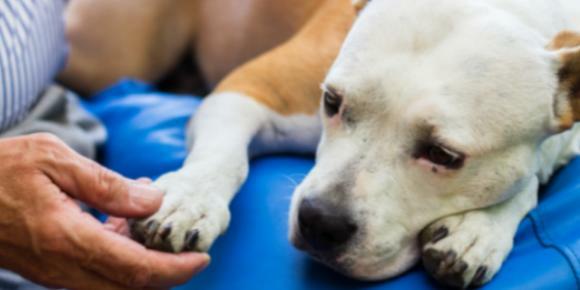Deciding if or when you should euthanize your pet is going to be one of the most difficult decisions you need to make, especially when your pet is suffering. A lot of emotions are going on at this time, which can easily and understandably get in the way of your being able to make end of life decisions.
The staff at Union Lake Veterinary Hospital completely understands what you’re going through, and want to share with you what you should know before euthanizing your pet.
Euthanasia
Euthanasia is often the best choice for pets who are suffering. Their suffering can be due to a terminal illness or to an unfortunate accident. Either way, we love our pets and when they are suffering, we want to be able to make the best choice that can help ease their suffering.
While most of the time euthanasia is planned, emergency situations can occur that require a veterinarian to recommend euthanasia. These situations tend to be very difficult because they are unexpected, which doesn’t give you much time when it comes to accepting and dealing with what’s happening.
What Veterinarians Wish You Knew
When you’ve made the decision that the best choice for your pet’s sake is euthanasia, we as veterinarians want you to be prepared. We encourage you to ask questions, as this will help you understand what is happening and the additional decisions you’ll need to make.
- One decision that needs to be made is who is going to be present during the actual euthanasia process. Family members who do not want to be present during the actual process can say their goodbyes beforehand. Others may want to be in the room.
- Another decision is what you are going to do with your pet’s remains. Options include individual or group cremation, burial at home or burial in a pet cemetery.
Other things we want you to know:
- You can choose when your pet will be euthanized. You’re often able to choose the day and time of euthanasia, which can help give you the time you need to mourn.
- You can choose where your pet will be euthanized. Common options include at the veterinarian’s office, your home, or outside.
- There’s no pain involved. A sedative is given to your pet that puts them to sleep or in such a deep state of relaxation that they aren’t aware of what’s happening. The veterinarian will then administer a drug to stop the heart from beating.
- After death, your pet’s body may move due to involuntary contractions and is completely normal. Please don’t be alarmed if this happens.
Taking Time to Heal
While losing a pet can be devastating because they are indeed part of our family, you can hopefully find solace in knowing that they are no longer suffering. Now, it’s important that you take care of yourself, as you’ve experienced a loss. It’s important that you understand that grieving is a completely natural process, so take all the time you need in order to get through the grieving process, which is an essential part of your being able to fully heal.
Our veterinarians and staff want you to know that we are available to assist you during this difficult time. The hospital can provide bereavement counseling if needed. Please don’t hesitate to contact us with any questions you have relating to euthanasia.

